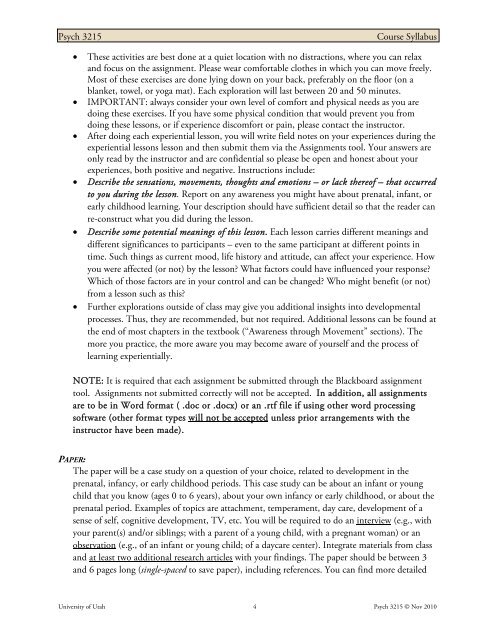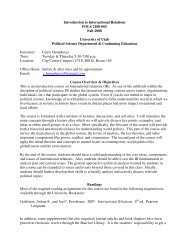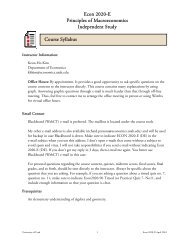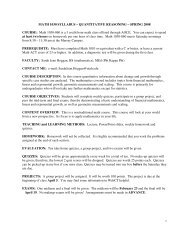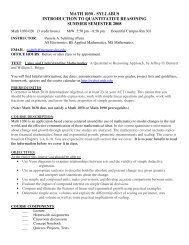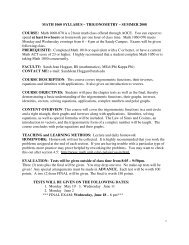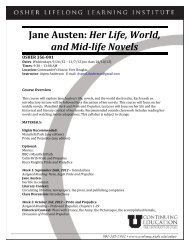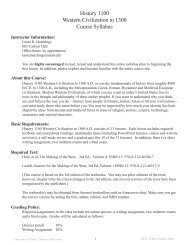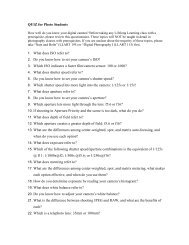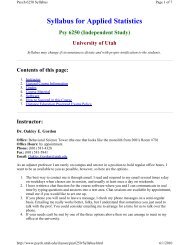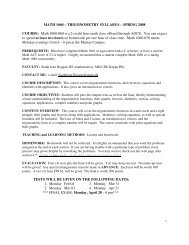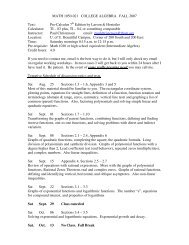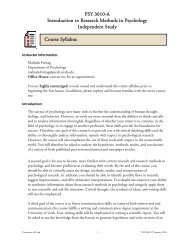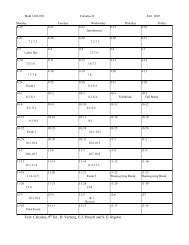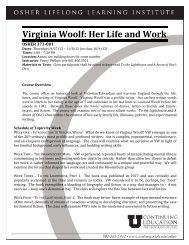Psychology 3215-B Development in Infancy & Early Childhood ...
Psychology 3215-B Development in Infancy & Early Childhood ...
Psychology 3215-B Development in Infancy & Early Childhood ...
You also want an ePaper? Increase the reach of your titles
YUMPU automatically turns print PDFs into web optimized ePapers that Google loves.
Psych <strong>3215</strong><br />
Course Syllabus<br />
<br />
<br />
<br />
<br />
<br />
<br />
These activities are best done at a quiet location with no distractions, where you can relax<br />
and focus on the assignment. Please wear comfortable clothes <strong>in</strong> which you can move freely.<br />
Most of these exercises are done ly<strong>in</strong>g down on your back, preferably on the floor (on a<br />
blanket, towel, or yoga mat). Each exploration will last between 20 and 50 m<strong>in</strong>utes.<br />
IMPORTANT: always consider your own level of comfort and physical needs as you are<br />
do<strong>in</strong>g these exercises. If you have some physical condition that would prevent you from<br />
do<strong>in</strong>g these lessons, or if experience discomfort or pa<strong>in</strong>, please contact the <strong>in</strong>structor.<br />
After do<strong>in</strong>g each experiential lesson, you will write field notes on your experiences dur<strong>in</strong>g the<br />
experiential lessons lesson and then submit them via the Assignments tool. Your answers are<br />
only read by the <strong>in</strong>structor and are confidential so please be open and honest about your<br />
experiences, both positive and negative. Instructions <strong>in</strong>clude:<br />
Describe the sensations, movements, thoughts and emotions – or lack thereof – that occurred<br />
to you dur<strong>in</strong>g the lesson. Report on any awareness you might have about prenatal, <strong>in</strong>fant, or<br />
early childhood learn<strong>in</strong>g. Your description should have sufficient detail so that the reader can<br />
re-construct what you did dur<strong>in</strong>g the lesson.<br />
Describe some potential mean<strong>in</strong>gs of this lesson. Each lesson carries different mean<strong>in</strong>gs and<br />
different significances to participants – even to the same participant at different po<strong>in</strong>ts <strong>in</strong><br />
time. Such th<strong>in</strong>gs as current mood, life history and attitude, can affect your experience. How<br />
you were affected (or not) by the lesson? What factors could have <strong>in</strong>fluenced your response?<br />
Which of those factors are <strong>in</strong> your control and can be changed? Who might benefit (or not)<br />
from a lesson such as this?<br />
Further explorations outside of class may give you additional <strong>in</strong>sights <strong>in</strong>to developmental<br />
processes. Thus, they are recommended, but not required. Additional lessons can be found at<br />
the end of most chapters <strong>in</strong> the textbook (“Awareness through Movement” sections). The<br />
more you practice, the more aware you may become aware of yourself and the process of<br />
learn<strong>in</strong>g experientially.<br />
NOTE: It is required that each assignment be submitted through the Blackboard assignment<br />
tool. Assignments not submitted correctly will not be accepted. In addition, all assignments<br />
are to be <strong>in</strong> Word format ( .doc or .docx) or an .rtf file if us<strong>in</strong>g other word process<strong>in</strong>g<br />
software (other format types will not be accepted unless prior arrangements with the<br />
<strong>in</strong>structor have been made).<br />
PAPER:<br />
The paper will be a case study on a question of your choice, related to development <strong>in</strong> the<br />
prenatal, <strong>in</strong>fancy, or early childhood periods. This case study can be about an <strong>in</strong>fant or young<br />
child that you know (ages 0 to 6 years), about your own <strong>in</strong>fancy or early childhood, or about the<br />
prenatal period. Examples of topics are attachment, temperament, day care, development of a<br />
sense of self, cognitive development, TV, etc. You will be required to do an <strong>in</strong>terview (e.g., with<br />
your parent(s) and/or sibl<strong>in</strong>gs; with a parent of a young child, with a pregnant woman) or an<br />
observation (e.g., of an <strong>in</strong>fant or young child; of a daycare center). Integrate materials from class<br />
and at least two additional research articles with your f<strong>in</strong>d<strong>in</strong>gs. The paper should be between 3<br />
and 6 pages long (s<strong>in</strong>gle-spaced to save paper), <strong>in</strong>clud<strong>in</strong>g references. You can f<strong>in</strong>d more detailed<br />
University of Utah 4<br />
Psych <strong>3215</strong> © Nov 2010


